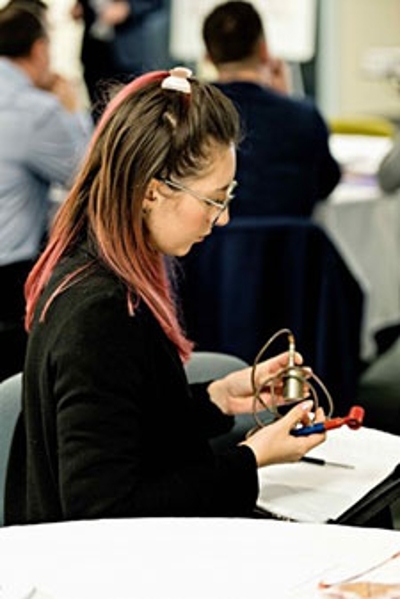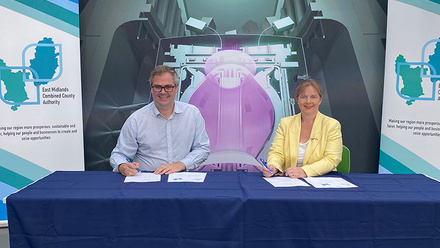The benefits of ongoing skills support and training
Technical workshops made their debut at the 2019 ClayTech event. Among the displays of automated brickmaking systems, binding materials and testing equipment, participants were able to take advantage of a series of educational sessions for the first time. Here, we take a look at the benefits of ongoing skills support and the history of the associations’ commitment to training.

On-the-go education was a brand new format that took off at last year’s ClayTech conference – and it was a big success. Students studying on any of the heavy clay industry technical courses were especially welcomed through the launch of the technical workshops. They were invited to join sessions to brush up their skills which included health and safety in quarries, raw materials, clay preparation and forming, and drying and firing, to gain an extra edge in skills, while having the opportunity to network, sharing knowledge and questions with peers and experts.
‘This year we made a significant change to the format and I was delighted to see that this was successful, with high attendances at all four training workshops, and very positive feedback for them all. There are still things we can improve, and the committee will be working hard to build on the new format in 2020,’ said ICTa Chairman, Andy Carp.
‘We are reviewing this year’s feedback and will be back next year with a further improved event. We are concentrating on improving the exhibition experience for everyone. I am sure many business deals were struck this year but we are aware that there are things we can do better, so watch this space.
‘ClayTech has for the last 18 years been the only event of its kind targeted at the heavy clay products sector in the UK. This is where you can come to meet all of your suppliers to discuss your upcoming capital projects and where exhibitors can offer new products and innovations to decision makers from all the UK heavy clay manufacturers. And where else can you receive specialist training in clay technology, whether you are enrolled on one of our training courses, thinking of studying for a qualification in the future or just want to learn more. ClayTech is the place to come.
‘ICTa has worked very hard over many years to produce high-quality training courses at all levels, and to build ClayTech as a key event in every company’s calendar. We have benefitted from a great deal of financial support from the ICT Trust. Without our input the industry would be lacking in the skills and knowledge needed to face the future with confidence.
‘We desperately need more involvement from manufacturers to keep this work going. We need fresh faces on our committees and more delegates at our events so I would put out a plea to key decision makers to make sure that we continue to close the skills gap, that we continue to grow as an industry and that in the future we are well placed to take our quality products to market and win business from others.
‘Looking back over 2019, it is pleasing that the industry has made steady progress despite the ongoing uncertainties surrounding Brexit issues. Many companies are still investing in capital projects, not least Forterra, which is building a new factory at its Desford site in Leicestershire, which it claims will be the biggest brick factory of its type in Europe. The backdrop to this, of course, is the lack of investment during the protracted recession in recent years during which very little was spent. Therefore, many factories find themselves faced with ageing equipment desperately in need of upgrading or replacement.’
ClayTech will return to Newark Showground for its 19th year in November 2020. For this year, Andy Carp is returning as ICTa Chairman, while the position of Secretary will be filled by Dave Willett of Michelmersh, taking over from Mike Chapman. The International Clay Technology Education and Training Committee will remain the same, with Paula Wardle as Chair.
25 years of ICT Trust
ICTa is a constituent part of the Ceramics Society, of which ICTa Education and Training Committee (ICTa ETC) is the operating committee. According to committee Chair, Paula Wardle, the aim of the organisation is ‘to promote and provide sources and opportunities for the education and training of all employees within the heavy clay industry’.
With this in mind, at the 2019 ClayTech event, ICTa ETC celebrated the academic achievement of students who had completed and achieved the highest grades in technical training courses available to the industry during the 2018-2019 academic year.
The awards ceremony portion of the day covered six training courses, sponsored by the ICT Trust and delivered by two organisations - An Introduction to Clay Technology Level 2 and Clay Technology Level 3 are run by IOM3, while the Diploma in Clay Studies, Foundation Degree in Clay Technology, Higher Apprenticeship in Clay Technology, and BSc in Minerals Management are all provided by the University of Derby, UK.
The 2019 winners were:
- An Introduction to Clay Technology: Level 2 – Lee Horsfield, Michelmersh
- Clay Technology: Level 3 – Jamie Brownlie, Michelmersh
- Diploma in Clay Studies – Jonathan Burrell, Forterra
- BSc in Minerals Management – Carl Cuthbert, Forterra. Carl Cuthbert from Forterra was the first Heavy Clayware Industry student to complete the University of Derby BSc (Hons) in Minerals Management. He also received the Ernest Simpson Trophy and Lisney Prizes.
- The Keith F R Morton Award – 2019, sponsored by the ICT Trust, was presented to Michelmersh Brick Holdings – Carlton Production Supervisor, Scott Todd. The judges said Scott exemplified the criteria indicated by Morton in his initial discussion paper. This award recognises academic achievement in clay technology through completion of one of the Technical Courses available to the Industry.
Former Ibstock Brick Production Director, the late Keith Morton, and his wife Moyra donated the Beehive Kiln trophy to the ICT Education and Training Trust, which was awarded to Keith in 2011 in recognition of service to ICT, ITCa and the UK clay industry’s education and training efforts. Keith died in May 2018.
ICT Trust Chair, Chris Hallas, explained that the trust was formed as a charity and is a separate entity to the ICTa ETC. The trust was formed because the West Midlands (WM) branch of ICTa wanted to pursue the sponsorship of formal education in ceramics.
The Brick Development Association had a grant scheme during the 1950s–1970s, which benefitted many in the heavy clay industry. The ICTa WM branch decided to follow this path and subsequently grace grants to three students at Staffordshire University.
Following this successful venture in 1992, then Chairman, Gwilym Lloyd, asked the WM branch for support in promoting the grant scheme at national level as part of his mission as President during 1992–1993. WM supported the mission and members agreed to find sponsors within the industry in the UK and across Europe to get the project running.
The success of this was brought to fruition at the 1992 conference when WM Branch Secretary, Colin Davies, presented a £9,000 cheque to Lloyd. After a series of meetings, the trust, as it is known today, finally received charity trust status in September 1994.
At their first meeting, the trustees agreed to invite Kevin Farrell to the position of Chairman and Bernard Robinson as Secretary to the trustees. It was also agreed that the ICTa Presidents and Immediate Past Presidents would become ex-officio members of the trustees. Further, the council proposed that the training committee should promote vocational training, and that this scheme should benefit from financial support from the newly formed trust.
From here, the ICT council set up a new education and training committee. After some time, the decision was made not to support full-time students, and that ICT should create its own qualifications that would served the needs of the industry.
Technical courses at Level 2 and 3 were developed with funding from the trust and additional funding obtained by The Refractories, Building Products Training Council – later known as Proskills – and in conjunction with Doncaster College, which merged with the University of Derby at a later date.
Qualifications at Level 4 and 5 were developed in conjunction with the University of Derby, which was made possible with funds from the ICT Trust, several ICTa branches, IOM3, Pottery Mechanics Institute, and the Brick Development Association.
About 500 students have completed the technical courses to date, all receiving the support of the ICT Trust funding. Last year’s ClayTech event was a clear indication that this approach to support is effective and continuing to grow and develop future talent.







